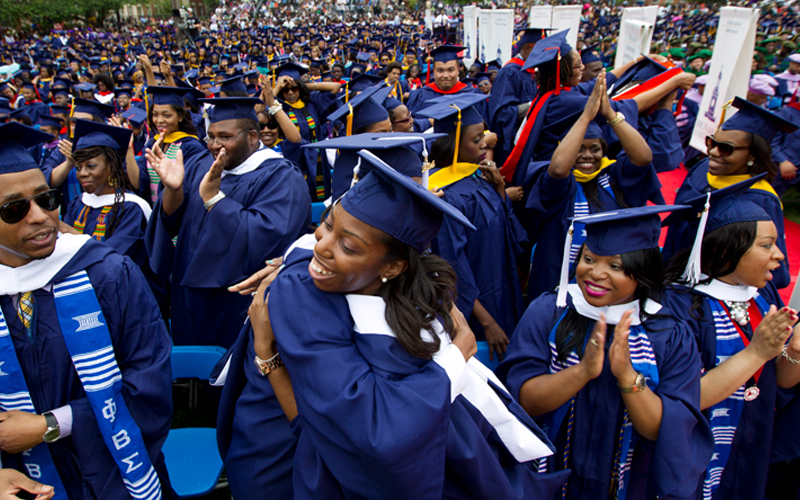As graduates of Historically Black Colleges and Universities (HBCUs), we know firsthand the transformative power these institutions hold. For generations, HBCUs have been a beacon of opportunity, providing Black students with not only an education but also a sense of pride, purpose, and community. Today, these schools continue to be essential in shaping the future of higher education, empowering students to rise above challenges and make lasting impacts on the world.
A Legacy of Opportunity and Access
HBCUs were originally established to provide higher education opportunities to Black Americans who were systematically denied admission to predominantly white institutions. This legacy of creating access continues to be one of the defining characteristics of these institutions. While HBCUs were created out of necessity, providing educational opportunities when segregation and exclusion were the norm, HBCUs continue to serve as gateways to higher education for many first-generation college students and those from underserved communities. They provide an environment where students can feel supported and encouraged to succeed, both academically and personally.
What began as a response to inequality has evolved into a foundation for Black excellence. For many of us, attending an HBCU meant stepping into a legacy rich with history, where the halls echo with the achievements of those who came before us. It’s where we found our voice, honed our skills, and realized our potential.
Even today, HBCUs are critical in leveling the playing field. Despite making up only 3% of higher education institutions, HBCUs graduate nearly 20% of Black students in the U.S., including a significant portion of Black professionals in fields like medicine, law, and STEM. These schools provide access to those who may not have had the chance to pursue higher education, opening doors that might have otherwise remained closed.
A Nurturing Environment for Growth
What truly sets HBCUs apart is the nurturing environment they create, one where students are not only seen and heard but actively supported throughout their academic journey. At these institutions, students are more than just numbers—they are part of a community that is deeply invested in their success. This culture of care and encouragement is what allows many students to thrive academically, socially, and personally.
Many of the largest and most prestigious HBCUs in the country, such as North Carolina A&T State University, Howard University, and Florida A&M University, have made an indelible impact on higher education. These schools are home to thousands of students, yet they manage to maintain a close-knit community feel, offering the personal support and attention that larger, predominantly white institutions often struggle to provide.
For instance, North Carolina A&T State University, the largest HBCU in the country, boasts an enrollment of over 13,000 students. It is also a leader in producing Black engineers, consistently ranking as one of the top producers of African American graduates in engineering and agriculture . Despite its size, the university is known for its strong sense of community and student support services that help guide students from enrollment to graduation.
At Howard University, which is often referred to as the “Mecca” of HBCUs, the focus on student development is woven into the fabric of the institution. Howard’s 10:1 student-to-faculty ratio ensures that students receive personalized attention, and it has long been recognized for producing some of the nation’s most successful Black leaders in medicine, law, and politics. Howard’s rich legacy of nurturing the next generation of Black professionals is seen in the accomplishments of its alumni, including the first Black U.S. Vice President, Kamala Harris.
Florida A&M University (FAMU), another of the largest HBCUs with around 10,000 students, excels at providing a supportive and empowering environment. FAMU is known for its emphasis on professional preparation, offering students internships, mentoring, and job placement opportunities that set them up for success post-graduation. In fact, FAMU has ranked as the top public HBCU for several consecutive years, demonstrating its commitment to fostering not only academic excellence but also career readiness .
Across the board, HBCUs maintain higher graduation rates for Black students than other predominantly white universities. The U.S. Department of Education reports that HBCUs have a 10-15% higher graduation rate for Black students compared to non-HBCU institutions. This speaks to the personalized support students receive—from dedicated faculty and staff to the array of resources tailored to address the unique challenges faced by first-generation and low-income students.
This nurturing environment, coupled with strong academic programs and a rich cultural heritage, is what sets HBCUs apart. They’re not just educating students—they’re building leaders, visionaries, and trailblazers for the future.
Celebrating Culture and Community
There’s a unique pride that comes from being part of an HBCU. Here, Black history, culture, and achievements are celebrated daily. Whether it’s attending a step show, walking through the quad, or engaging in conversations about our shared experiences, HBCUs foster a sense of belonging that’s hard to replicate anywhere else.
At an HBCU, you’re surrounded by people who understand your journey, your struggles, and your triumphs. This community extends far beyond graduation, as alumni networks are strong, supportive, and full of individuals who want to see you succeed. It’s a bond that lasts a lifetime, one built on shared history, values, and vision for the future.
A Launchpad for Leadership and Success
HBCUs aren’t just about academics—they’re about building leaders. Many of us found our calling through the opportunities presented on campus: student government, clubs, community service, and internships that helped us develop the skills needed to lead. HBCUs produce a remarkable number of Black leaders in government, business, education, and the arts, showing that these institutions continue to prepare graduates to take on leadership roles in every corner of society.
From civil rights icons to CEOs, the list of influential HBCU alumni is long and distinguished. This is more than just a point of pride—it’s a reminder that the education and experiences we gain at HBCUs empower us to take on the world.
A Vision for the Future
In today’s ever-changing world, HBCUs are as relevant as ever. They continue to adapt, offering programs and resources that prepare students for the workforce of tomorrow. Whether it’s through cutting-edge research, partnerships with top organizations, or professional development opportunities, HBCUs are investing in the future of their students and communities.
As graduates, we carry forward the lessons, pride, and knowledge gained at these institutions. We’re part of a legacy that’s still being written, a legacy of Black excellence, resilience, and achievement. And as HBCUs continue to uplift and inspire future generations, their importance in higher education will only grow.
Historically Black Colleges and Universities are more than just schools—they are spaces of empowerment, culture, and progress. As HBCU graduates, we know that these institutions aren’t just important—they’re indispensable. They’ve been the backbone of Black educational achievement for generations, and they will continue to serve as vital centers of excellence, leadership, and opportunity. Whether you’re a prospective student, an alum, or someone in the business community, supporting HBCUs through scholarships like the Williams-Franklin Foundation is an investment in a brighter future for all of us.




